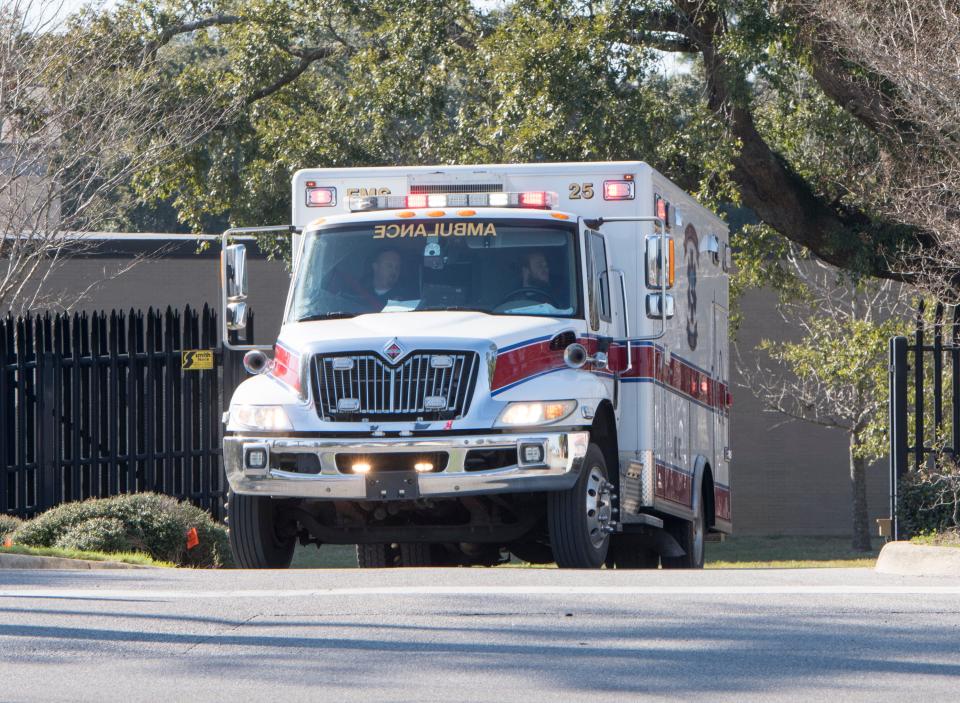There were 23 opioid overdoses in Escambia last week. New CORE program may turn the tide.
Escambia County is looking to launch its new Emergency Medical Service Coordinated Opioid Recovery, or CORE program, as soon as December.
Public Safety Director Eric Gilmore said the county is actively hiring nurses and EMTs who will play key roles in the CORE program.
"We are hopeful we can get this thing up and going before the end of the year, if not shortly after the beginning of the year," Gilmore said during a "Coffee with the Commissioner" livestream hosted by Commissioner Jeff Bergosh earlier this month. "So we were moving as quick as we can on this one."
Setting up CORE: Amid rising overdoses, Escambia EMS launching 'wrap-around service' to reduce relapses
Numbers 'they can't ignore': Northwest Florida sees 354% increase in fentanyl deaths
The CORE program is part of a state-funded effort to address the opioid crisis. Earlier this year, Gov. Ron DeSantis announced Escambia County would be one of nine counties participating in the program.
The program will have EMS personnel work with overdose victims who want to get treatment for opioid addiction. It's meant to act as a bridge during the period between the patient leaving the hospital and attending their first appointment with a long-term drug treatment center.
Palm Beach County was the first county to have the pilot program, and 83.5% of people who entered the program had not had another overdose, according to Escambia County EMS manager David Torsell.
Torsell said in September that the CORE program aims to be the county's "missing piece" in lowering the number of overdoses the county experiences.
As of Monday, Escambia County EMS had responded to 1,860 overdoses this year, with 23 occurring during the week of Nov. 14.
Community Health of Northwest Florida will also participate in the CORE program as a long-term treatment provider.
When a person is brought to the emergency room of one of the area hospitals for an overdose, they will be asked if they want to participate in the CORE Program, and if they agree, they will be connected with an EMS member.

The EMS member will administer daily treatment of Suboxone, which helps treat the symptoms of withdrawal, for up to seven days until their first appointment at Community Health Northwest Florida, according to the organization's CEO, Chandra Smiley.
"We have a peer counselor who will go out with the paramedics and meet with our patients and go ahead and make that connection so that there's a friendly face when they do come to their appointment with us," Smiley said during the livestream.
The program will be available to anyone regardless of insurance status.
Dr. Mark Stavros is medical director of the emergency department at HCA Florida West Hospital and specializes in the treatment of opioid addiction. He said once a person is addicted to opioids, it becomes a disease they'll have to manage for the rest of their lives.
"After a period of time of taking these drugs over and over again, they've created pathways (in their brain) saying, 'This is the most important thing in life, this is almost as important as taking a breath, and if I don't take this drug, I feel like I'm going to die,'" Stavros said. "And their brain is telling them, you need to take this, it's a matter of life or death. And from us, from the outside, we look at them, like, that's nuts, how could you possibly make that choice, but their brain is changed to a point where that is the most important choice."
During the livestream, Bergosh asked Stavros his opinion on cities in other states setting up "safe injection sites," which is not part of the CORE program.
Stavros said he's conflicted but comes down on the side of supporting them just from a pure harm reduction standpoint. Stavros said the safe injection sites could dramatically reduce the instances of diseases such as HIV, Hepatitis C and endocarditis from unsafe needles.
"Changing a (heart) valve of a patient is hundreds of thousands of dollars, that's coming right from injection," Stavros said. "If that person were injecting something safer, and not getting endocarditis, that literally saved all the taxpayers hundreds of thousands of dollars for that one patient."
Stavros said any safe injection site should be paired with the ability for any user to get drug addiction treatment if they want it.
Addiction expert weighs in: CivicCon: Fight opioid addiction like a disease, says Dr. Marvin Seppala
"We might offer you a safer alternative, but at the same time, we're also going to offer you the ability to get into recovery, too," Stavros said.
Bergosh said he found Stavros answers really interesting but also acknowledged setting up a safe injection site in Escambia County might be a "political lightning bolt."
"I don't know if we would have (the ability to do that)," Bergosh said. "I'd have to ask (County Attorney) Allison Rogers that, but I'm all about saving people, especially people who have a disease and can't control it."
Jim Little can be reached at jwlittle@pnj.com and 850-208-9827.
This article originally appeared on Pensacola News Journal: Escambia County prepares to launch Coordinated Opioid Recovery

